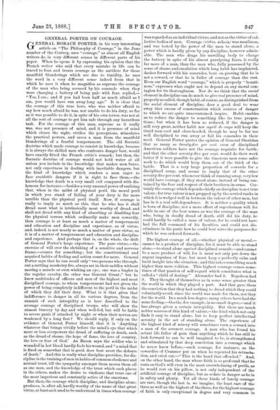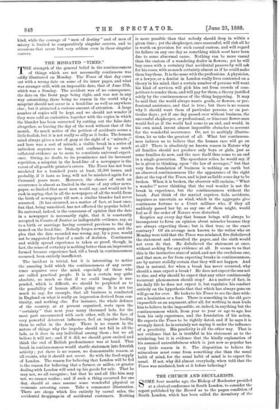GENERAL PORTER ON COURAGE.
GENERAL HORACE PORTER, in his very interesting article on "The Philosophy of Courage," in the June number of the Century, uses "courage," as almost all English writers do, in very different senses in different parts of his paper. When he opens it by expressing his opinion that the French writer who said that every mistake in life can be traced to fear, and treats courage as the antidote for those manifold blunderings which are due to timidity, he uses the word in a very different sense indeed from that in which he uses it when he magnifies as supreme the courage of the man who, being accused by his comrade when they were charging a battery of being pale with fear, replied,— " Yes, I am ; and if you had been half as much afraid as I am, you would have run away long ago." It is clear that the courage of this true hero, who was neither afraid to say how much afraid he was, nor unable to do his duty, so far as it was possible to do it, in spite of his own terror, was not at all the sort of courage to get him safe through any hazardous task. For the courage of this man, supreme as it really was, was not presence of mind, and it is presence of mind which clears the sight, vivifies the perceptions, stimulates the practical powers, and saves a man from the manifold blunderings of a fearful temperament. The old Socratic doctrine which made courage to consist in knowledge, because it is always the skilled man who confronts danger best, would have exactly fitted the French critic's remark ; but then, the Socratic doctrine of courage would not hold water at all unless you include in the knowledge that makes men brave, not only expertness in dealing with inevitable dangers, but the kind of knowledge which renders a man eager to face avoidable dangers if it is right to face them,—the knowledge that death is a very small evil compared with dis- honour, for instance,—besides a very unusual power of realising that, when in the midst of physical peril, the moral peril in which you stand of failing of your duty is far more terrible than the physical peril itself. Now, if courage is really to imply as much as this, that he who has it shall dread most what is intrinsically most worthy of dread, and shall not dread with any kind of absorbing or disabling fear the physical terrors which ordinarily make men cowardly, then courage is at least as much a matter of temperament and education and discipline and experience, as of virtue, and, indeed, is not nearly so much a matter of pure virtue, as it is of a matter of temperament and education and discipline and experience. And perhaps that is, on the whole, the drift of General Porter's large experience. The pure virtue,—the exercise of will over the shrinking of a sensitive and nervous frame,—counts for something ; but the constitutional and acquired habits of feeling and action count for more. General Porter says that he can recall only" two persons who through- out a rattling musketry fire, always sat in their saddles without moving a muscle or even winking an eye; one was a bugler in the regular cavalry, the other was General Grant ;" but he knew multitudes of officers and men of the highest and most disciplined courage, to whom temperament had not given the power of being completely indifferent to the peril in the midst of which they did their duty. What is it that gives that indifference to danger in all its various degrees, from the summit of such intrepidity as is here described to the average courage of disciplined troops, who will show the utmost bravery by day and when well-fed, but will be liable to severe panic if attacked by night or when their nerves are weakened by a long fast ? We should reply, if only on the evidence of General, Porter himself, that it is 'Anything whatever that brings vividly before the mind's eye that which more or less overpowers the dread of suffering or death, such as the dread of shame, the hope of fame, the love of country, the love or fear of God.' As Bacon says, the soldier who is wounded in hot blood hardly feels his wound, and "a mind that is fixed on somewhat that is good, does best avert the dolours of death." And this is really what discipline provides; for dis- cipline is the training of men in habits of common obedience and mutual trust, till the sympathy amongst them moves them all as one man, and the knowledge of the trust which each places in the others, makes the desire to vindicate that trust one of the most imperious and constantly active of the emotions.
But then, the courage which discipline, and discipline alone, produces, is, after all, hardly worthy of the name of that great virtue, at least as it used to be understood in times when courage ,
was regarded as an individual virtue, and not as the virtue of col- lective bodies of men. Courage (virtus, dApgiat) was manliness, and was tested by the power of the man to stand alone, a power which is hardly given by any discipline, however admir- • able. The man who drags his unwilling body to charge the battery in spite of his almost paralysing fears, is really far more of a man, than the man who, fully possessed by the sense of shame and emulation which long habit has implanted, dashes forward with his comrades, bent on proving that he is not a coward, or that he is fuller of courage than the rest. Even our English word "courage," which is properly " hearti- ness," expresses what ought not to depend on any moral con- tagion for its thoroughness. Nor do we think that the soda/ element in discipline can do much to give real presence of mind, properly so called, though habit, of course, as distinguished from the social element of discipline, does a good deal to wear away that excess of consternation which sources of danger to which we are quite unaccustomed, inspire. Habit enables us to reduce the danger to something like its true propor- tions; but when it has been so reduced, if the danger is still very great, neither habit nor esprit de corps will keep the timid man cool and clear-headed, though he may be far too well disciplined to run away or fail his comrades in their need. General Porter quotes the opinion of General Sheridan that as many as twenty-five per cent, even of disciplined American soldiers have not the courage requisite for battle, and that the other seventy-five per cent. would do their work better if it were possible to give the timorous men some safer work to do which would keep them out of the thick of the battle. That is a very large proportion of cowards for a disciplined army, and seems to imply that of the other seventy-five per cent, who never think of running away, very few would have courage, if they stood alone, instead of being sus- tained by the fear and respect of their brethren-in-arms. Cer- tainly the courage which depends chiefly on discipline is not true valour; for true valour is not propped up by the serried ranks in which it is wedged well in between the valour of other men, but has in it a real self-dependence. It is neither a quality which is born of discipline, nor a mere effort of superhuman will, for noble in one of the best senses as was the courage of the man who, being in deadly dread of death, still did his duty, he could hardly be called a man of valour, for he could not have had the full command of his faculties, and could not dis- criminate in his panic how he could best serve the purposes for which he was ordered forwards.
The highest courage of all,—whether physical or moral,–.- cannot be a product of discipline, for it must be able to stand alone,—to stand alone against disciplined assault,—and cannot be a mere product of will, for it must not only put down the urgent impulses of fear, but must keep a perfectly calm and lucid insight into the situation ; and this takes something much higher than mere volition. This highest courage comes some- times of that passion of self-regard which constitutes what is called a" child of destiny." Alexander had it. Napoleon had it. They thought of themselves as in some sense greater than the world in which they played a part. And that gave them the conviction that they had nothing to dread which they could voluntarily avoid, since the world was made for them, not they for the world. In a much less degree, many others have had the same feeling,—Goethe, for example, in no small degree,—and it has always given a certain intrepidity. But there are much nobler sources of this kind of valour,—the kind which not only finds it easy to stand alone, but to keep perfect intellectual serenity in the act of standing alone. The experience of the highest kind of misery will sometimes turn a coward into a man of the serenest courage. A man who has found his actual life fuller of pain than anything which he has still to look forward to can be well imagined to be, is strengthened and stimulated by that deep conviction into a courage which he never knew before,—such courage, for instance, as the cowardice of Cranmer put on when he repented his retracts.. tion, and cried out,—" This is the hand that offended." And, on the other hand, the man whose faith is so profound that he rests on God's will even in the most overwhelming of perils, as he would rest on his pillow, is not only independent of the artificial courage of discipline, but as sedate in danger as he is in safety and plenty. Yet all these kinds of lonely courage are rare, though the last is, we imagine, the least rare of the three as well as the highest of the three, for the highest courage of faith is only exceptional in degree and very common in
kind, while the courage of "men of destiny" and of men of misery is limited to comparatively singular careers, and to occasions that occur but very seldom even in those singular careers.







































 Previous page
Previous page